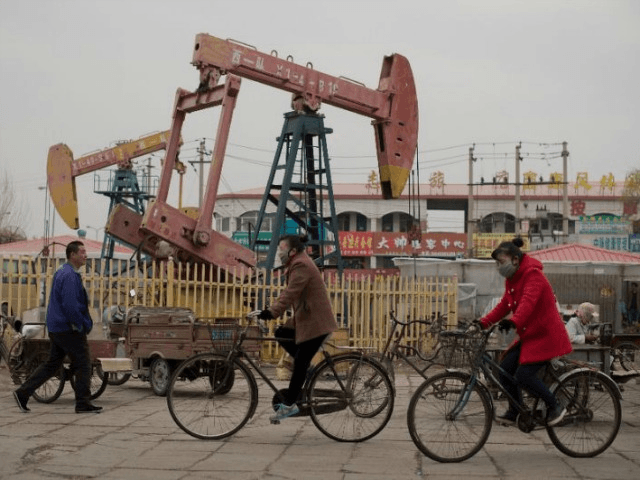China is abiding by United Nations sanctions on North Korea, halting shipments of coal and seafood, among other exports. Yet, as they fall out of the scope of the sanctions, China continues to supply Pyongyang with a pivotal oil supply that can diminish the effects of the sanctions, Australia’s ABC reported Sunday.
“China is North Korea’s sole supplier of oil and a couple of kilometres from the border sits an oil facility with six large storage tanks,” an ABC report revealed. “Oil is pumped across the border continuously from the centre into North Korea—they do not want the world to see it, so the site is under military protection.”
The report makes the case that cutting off North Korea’s oil supply would be the most effective sanction on the communist regime there, as it would prevent the country from functioning almost completely, and Chinese oil “keeps North Korea’s military going and the North Korean economy alive.”
ABC adds that it has evidence that China also hires “cheap” North Korean workers to help refine the oil.
Following the testing of what Pyongyang claimed to be an intercontinental ballistic missile (ICBM), the United Nations voted unanimously to sanction the country, blocking exports of iron, iron ore, lead, lead ore, and seafood to any of the countries beholden by UN resolutions. This includes China, whose border area with North Korea, ABC notes, has suffered a significant decline in cheap and plentiful seafood since the sanctions took hold.
The continued shipment of Chinese oil into North Korea is notable despite their absence in the resolution because of how much damage an oil ban could do to the Kim Jong-un regime, and the fact that China has already diminished the amount of oil crossing the border. In June, China’s state-run oil company announced that it would suspend all sales to North Korea, denying that the decision had anything to do with Kim’s routine threats of nuclear war or the atrocious human rights violations his government stands accused of. Instead, Beijing claimed the decision was “commercial”—a result of the diminishing likelihood of North Korea being able to actually pay for the oil.
Since that announcement, reports have increased of North Korea doing business with Russia to acquire their oil. In a report this week, the Korean outlet KBS cites a Japanese newspaper which reported that “Russia exported 43-hundred tons of oil products such as gasoline and diesel oil to North Korea in the first six months of the year,” doubling its shipments in the same half of 2016. The newspaper in question, Sankei Shimbun, claimed the figure came out of Russian customs data.
“The shipments are said to be worth two-point-four million U.S. dollars, which is a two-fold increase from a year earlier,” KBS reported.
In June, defecting North Korean government official Ri Jong Ho told journalists that Kim had increasingly begun to rely on Russian oil to run the country. “It is a wrong perception that North Korea is completely dependent on China,” Ri said at the time.
While China remains North Korea’s greatest ally, evidence has surfaced over the past year of tensions between the two communist governments. North Korea’s state newspaper, Rodong Sinmun, directly attacked China as a false ally in a May editorial. “China should no longer try to test the limits of the DPRK’s patience. China had better ponder over the grave consequences to be entailed by its reckless act of chopping down the pillar of the DPRK-China relations,” the editorial read.
The Rodong went on to accuse China of “dancing to the tune of the U.S.”
On Monday, the Rodong was still railing against the UN sanctions, calling them “a blatant challenge to the DPRK as it is part of the hideous moves of the U.S. and other hostile forces, scared by the daily growing military muscle of Juche Korea.” “Juche” is the cultish philosophy of the Kim family known as “self-reliance,” which preaches complete subservience to the Kims.
“If the U.S. persists in extremely military adventure and sanctions and pressure, seized with anachronistic wild ambition, while failing to face up to the trend of the times, it will only meet shameful destruction and final ruin,” Rodong warned.

COMMENTS
Please let us know if you're having issues with commenting.